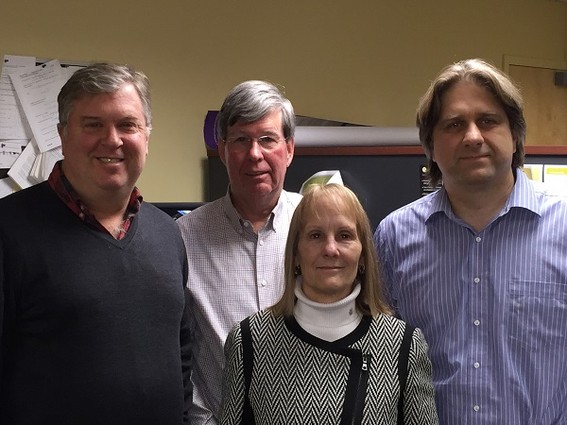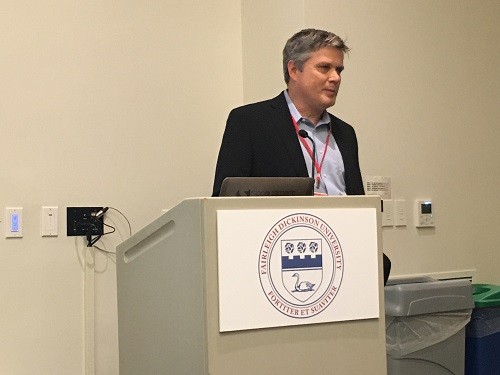Startup Roundup: Simphotek, Bizyhood, Modelshop

Simphotek: What happens when you optimize a cancer treatment using software? A possible organ-sparing, life-saving alternative therapy to chemo and radiation becomes viable. That’s what the startup Simphotek is betting on. The company, which has been around for two years, is part of the Enterprise Development Center (EDC) incubator at New Jersey Institute of Technology (NJIT), in Newark. It needs money to further develop its software, said Simphotek President Mary Potasek when she pitched at the EDC Summit, held at NJIT in late October.
Cancer treatments can be hard to describe. With this one, called “Photodynamic Therapy,” a drug is injected into the patient. This isn’t a chemo drug, however. It simply activates chemical reactions in cancer cells when combined with the light from a laser. The combination of the laser light and the drug produces reactive ions that kill cancer cells. Potasek notes that this technique is well-known, but the problem is that it’s impossible to determine how much light to use or how long to use it on various tumors. It works on some tumors and not on others, but no one knows whether this is because of the technique used by the practitioner, the kind of tumor, or the length of time cancer cells are exposed to the light.
What is needed to perfect this technique is optimization software, Potasek says. “Radiation therapy, which is done with X-Rays, really didn’t become a viable alternative treatment until people developed a computer-based optimization algorithm and software that allowed the doctors to localize the radiation that got to the tumor… This computer-based optimization method led to exponential growth of radiation therapy, which is now about a $6 billion market.We are saying if we can provide the optimization software, similar to what was done with radiation, then there is every possibility that this light based treatment that is easier on the patient than radiation or chemotherapy may become a standard alternative treatment” in the same way radiation or chemotherapy are standard therapies. Using this optimization method, we expect the market size of PDT to grow in size similar to radiation therapy.
The company is working with the Hospital of the University of Pennsylvania, and has received a Small Business Innovation Research (SBIR) grant. It has applied for a Phase II grant to help it move to the next level, so it can start testing the software and get a better idea of how it needs to be tweaked, according to Potasek. She noted that the company also needs external funding of around $2 million to move product development along to the stage at which the technique could. be used in trials in collaboration with Penn.
It should be noted that Penn is already performing Phase 2/3 human clinical trials on 100 patients and will incorporate Simphotek’s software when it becomes available for testing. This Penn-Simphotek collaboration significantly reduces the risk and cost of trials and product development, she said. In addition, the product will lead to personalized treatment for cancer patients. “We are looking for angel, VC, donations or philanthropy” money to complete the product, she said.

Bizyhood:Bizyhood (Asbury Park) provided us with a year-end Q4 2015 update. The company has been concentrating on developing “Bizyhood for Publishers,” a technology platform for hyperlocal digital publishers who already have an intimate knowledge of their community and want to add a new revenue stream based on customer engagement.
Said founder Scott Barnett, “At the start of the summer, our goal was to have six communities launched on Bizyhood by the end of Q3, and 12 by the end of Q4. We have exceeded our goals and then some.”
He added that the startup now has 20 publishers signed up and is running on a total of 30 hyperlocal sites. More importantly, the company started generating revenue in November. “We have launched our own search feature for the publishers to use on their sites,” he said. There is “still work to do here, but this is a game changer for them.”
Barnett said that Bizyhood is “shrinking the Internet” for hyperlocal publishers, making them easily found brands in their communities. “We are also exploring how to offer them a strong mobile presence through the Bizyhood platform,” Barnett said.

Modelshop: Tom Tobin, founder of Modelshop (Caldwell), presented at the Morris Tech Meetup in November. He said that his startup brings real-time analytic “decisioning” to small companies and is in beta. Modelshop builds analytic applications driven by predictive analysis and big data so that small businesses can make real-time decisions.
“There is a lot of technology available to analyze data, understand the meaning behind it, the inferences from it and make projections about what might happen in the future based on historic timelines,” said Tobin, who added that there is a ton of interest in the industry in looking at data and drawing inferences.
In the end, what these tools do is produce predictive models that are effectively equations. You can use these equations to ask things like, “given a new set of information, how likely is this person to commit fraud?” or “how likely is this person to default on his credit?” or “how likely is this medical procedure going to cause harm based on the information I have?”
“But the hard part of all this is applying it,” Tobin told the audience. He then asked, “How do you take these predictions and turn them into business actions?” He noted that this was where he had spent his career, and added that it’s difficult to build these systems.
Business analysts, who are responsible for turning data into decisions, are often still using Excel spreadsheets, he said. Business intelligence “is one of the most over-hyped technologies around. …It’s really hard to make real-time decisions” using the tools available today. Real-time analytic applications exist, but they are very hard to use and cost millions of dollars, and users fortunate enough to afford them have to bring vendors back into their shops to make changes.
Modelshop is making techniques that have been available to large businesses available to new businesses, he said. “There is really an opportunity for this automated decision-making aspect of big data.” He added that making real-time decisions is the piece of the market that Modelshop is targeting.
In a follow-up email, Tobin noted that Modelshop is currently working with a handful of early adopters in the student and auto lending markets to deliver intelligent automated “decisioning” and pricing. The technology will become generally available in the first half of this year.

